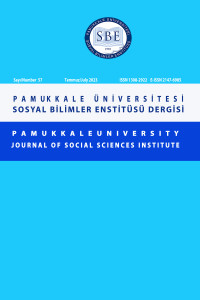Abstract
The term, grotesque is a technique that is used to unite oppositions such as comedy and horror, pleasure and repulsion. Originally appearing in Renaissance art, the grotesque was also employed in literature. Thomas Mann claims that “the grotesque is its most genuine style” (1991: 13) , because of the sense of loss, alienation and meaninglessness caused by the Great War. In terms of the theme of alienation, two protagonists Hazel Motes from Flannery O’Connor’s Wise Blood and Turgut Özben from Oğuz Atay’s Tutunamayanlar are significant with their almost insane representations in society. In this paper, two novels from two different countries will be analysed to observe the elements of the grotesque and revealed how the authors applied the elements in their novels to criticise and satirize the social and political corruption in their own countries.
References
- Apaydın, M. (2007). “Oğuz Atay’ın Tutunamayanlar Adlı Romanında Mizah ve Hiciv Öğeleri”, Ç.Ü. Sosyal Bilimler Enstitüsü Dergisi, 16/1. 45-68.
- Atay, O. (2003). Tutunamayanlar. İletişim Yayınları, Istanbul.
- Bachelard, G. (1994). The Poetics of Space. Trans. Maria Jolas. Beacon Press, Boston.
- Bakhtin, M. M. (1984). Rabelais and His World. Trans. Helene Iswolsky. Indiana UP, Bloomington.
- Clark, J.R. (1991) Modern Satiric Grotesque and Its Traditions. UP of Kentucky, Kentucky.
- Edwards, J. D. and Rune G. (2013). Grotesque. Routledge, London.
- Elçi, H.İ. (2003). Roman ve Mekan: Türk Romanında Ev. Arma Yayınları, Istanbul.
- Ellmann, R. and Feidelson, C. (1965). “Preface” The Modern Tradition: Backgrounds of Modern Literature. Oxford UP, New York. v-ix.
- Lukács, G. (1971). The Theory of the Novel. Trans. Anna Bostock. The MIT Press, Massachusetts.
- Makaryk, I.R. (1993). Encyclopedia of Contemporary Literary Theory: Approaches, Scholars, Terms. U of Toronto P., Toronto.
- Mc Elroy, B. (1989). Fiction of the Modern Grotesque. Palgrave Macmillan UK, London.
- Novak, M.E. (1979). “Gothic Fiction and the Grotesque”, NOVEL: A Forum on Fiction, 13/1, 50-67.
- O’Connor, F. (1970). Mystery and Manners: Occasional Prose. Eds. Sally and Robert Fitzgerald. Farrar, Straus & Giroux, New York.
- O’Connor, F. (2008). Wise Blood. Faber and Faber, London.
- Pappenheim, F. (1968). The Alienation of Modern Man: An Interpretation Based on Marx and Tönnies. Monthly Review Press, New York.
- Rath, S.P. (2010). “Carnivalized Public Corruption: Old Feudalism and New Democracy in All the King’s Men, Wise Blood, and Raag Darbari”, Comparative American Studies An International Journal, 8/1. 39-56.
Abstract
Grotesk terimi, komedi ve korku, zevk ve tiksinti gibi karşıtlıkları içinde barındıran bir tekniktir. Başlangıçta Rönesans sanatında ortaya çıkan grotesk, sonraları edebiyatta da kullanılmıştır. Thomas Mann, Birinci Dünya Savaşı’nın yarattığı kayıp, yabancılaşma ve anlamsızlık duygusundan dolayı groteskin “en özgün tarz" olduğunu iddia eder (1991: 13). Yabancılaşma teması açısından Flannery O'Connor'ın Wise Blood romanından Hazel Motes ve Oğuz Atay'ın Tutunamayanlar romanından Turgut Özben, toplumdaki delirme temsilleriyle dikkat çekmektedir. Bu çalışmada, iki farklı ülkeden iki roman incelenerek eserlerdeki grotesk unsurlar incelenecek ve yazarların kendi ülkelerindeki toplumsal ve siyasi yozlaşmayı eleştirmek ve hicvetmek için romanlarındaki unsurları nasıl uyguladıkları ortaya konulacaktır.
References
- Apaydın, M. (2007). “Oğuz Atay’ın Tutunamayanlar Adlı Romanında Mizah ve Hiciv Öğeleri”, Ç.Ü. Sosyal Bilimler Enstitüsü Dergisi, 16/1. 45-68.
- Atay, O. (2003). Tutunamayanlar. İletişim Yayınları, Istanbul.
- Bachelard, G. (1994). The Poetics of Space. Trans. Maria Jolas. Beacon Press, Boston.
- Bakhtin, M. M. (1984). Rabelais and His World. Trans. Helene Iswolsky. Indiana UP, Bloomington.
- Clark, J.R. (1991) Modern Satiric Grotesque and Its Traditions. UP of Kentucky, Kentucky.
- Edwards, J. D. and Rune G. (2013). Grotesque. Routledge, London.
- Elçi, H.İ. (2003). Roman ve Mekan: Türk Romanında Ev. Arma Yayınları, Istanbul.
- Ellmann, R. and Feidelson, C. (1965). “Preface” The Modern Tradition: Backgrounds of Modern Literature. Oxford UP, New York. v-ix.
- Lukács, G. (1971). The Theory of the Novel. Trans. Anna Bostock. The MIT Press, Massachusetts.
- Makaryk, I.R. (1993). Encyclopedia of Contemporary Literary Theory: Approaches, Scholars, Terms. U of Toronto P., Toronto.
- Mc Elroy, B. (1989). Fiction of the Modern Grotesque. Palgrave Macmillan UK, London.
- Novak, M.E. (1979). “Gothic Fiction and the Grotesque”, NOVEL: A Forum on Fiction, 13/1, 50-67.
- O’Connor, F. (1970). Mystery and Manners: Occasional Prose. Eds. Sally and Robert Fitzgerald. Farrar, Straus & Giroux, New York.
- O’Connor, F. (2008). Wise Blood. Faber and Faber, London.
- Pappenheim, F. (1968). The Alienation of Modern Man: An Interpretation Based on Marx and Tönnies. Monthly Review Press, New York.
- Rath, S.P. (2010). “Carnivalized Public Corruption: Old Feudalism and New Democracy in All the King’s Men, Wise Blood, and Raag Darbari”, Comparative American Studies An International Journal, 8/1. 39-56.
Details
| Primary Language | English |
|---|---|
| Subjects | Creative Arts and Writing |
| Journal Section | Research Article |
| Authors | |
| Early Pub Date | July 5, 2023 |
| Publication Date | July 18, 2023 |
| Acceptance Date | April 11, 2023 |
| Published in Issue | Year 2023 Issue: 57 |

